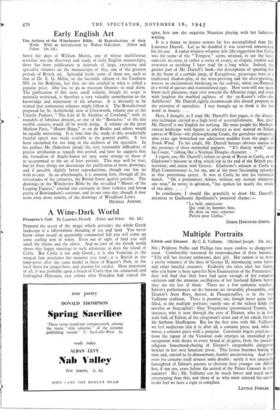A Wine-Dark World
Prospero's Cell. By Laurence Durrell. (Faber and Faber. 10s. 6d.)
PERHAPS the secret of the magic which pervades the whole Greek landscape is a labyrinthine blending of sea and land. You never know when round an apparently continental hill you will come on some curling arm of water. Even out of sight of land you still smell the thyme and the olives. And no part of the Greek world shows this happy marriage to such advantage as does the island of Corfu. But Corfu is not only Greek ; it is also Venetian, as the winged lion proclaims the moment you land ; it is British in the lamp-posts after the same model as those of Regent's Park, in the local thirst for ginger-beer, and passion for cricket. Most important of all, it was probably upon a beach of Corfu that the exhausted and bedrUgled Odysseus, cast ashore after Poseidon had vented his spite, first saw the exquisite Nausicaa playing with her ladies-in- waiting.
It is a theme to inspire writers far less accomplished than Mr. Laurence Durrell. Let us be thankful it was reserved untarnished for, his use. A rather whimsy-whamsy title (the suggestion that Corfu was the scene of the " Tempest " seems strained, to say the least) conceals an essay, or rather a series of essays, as elegant, erudite and evocative as anything I have read for a long while. Indeed, the greater pan of Mr. Durrell's book—the descriptions of spearing fish in the beam of a carbide lamp, of Karaghiosis picaresque hero of a traditional shadow-play, of the wine-pressing and the olive-piessing, weaves an enchantment bordering on the sadistic, when encAntered in a world of queues and reconstituted eggs. How soon will one again know such pleasures, stare over towards the Albanian crags, and roam with laughter the marbled ugliness of the ex-Kaiser's villa—the Achilleion? Mr. Durrell rightly recommends this absurd property to the attention of surrealists. I was brought up to think it the last word in beauty. . . .
Here, I thought, as I read Mr. Durrell's first pages, is the discur- sive technique carried to a high level of accomplishment. But, alas! Mr. Durrell is not English for nothing. He must people his Mediter- ranean landscape with figures as arbitrary as ever marred an Italian canvas of Wilson—the philosophising Count, the garrulous antiquary, who years ago bewitched our adolescent noddles from the pages of South Wind. To his credit, Mr. Durrell betrays obvious unease in the presence of these outmoded puppets. "It's thirsty work," says his Count, "talking like a Norman Douglas character. . . ."
I regret, too, Mr. Durrell's failure to speak of Byron in Corfu, or of Gladstone's mission in 1859, which led to the end of the British pro- tectorate, and union with Greece. Gladstone's sojourn at Corfu as High Commissioner is, for me, one of the most fascinating episodes in that portentous career. It was at Corfu he met his rhetorical match. " On a preliminary debate, without any motion whatever, one man," he wrote in agitation, "has spoken for nearly the whole of two days. . . ."
In conclusion, I should like gratefully to draw Mr. Durrell's attention to Guillaume Apollinaire's immortal rhyme:— "La belle americaine Qui rend les hommes fous, En deux ou trois semaines Partira pour Corfou."
SIMON HARCOURT-SMITH.






























 Previous page
Previous page